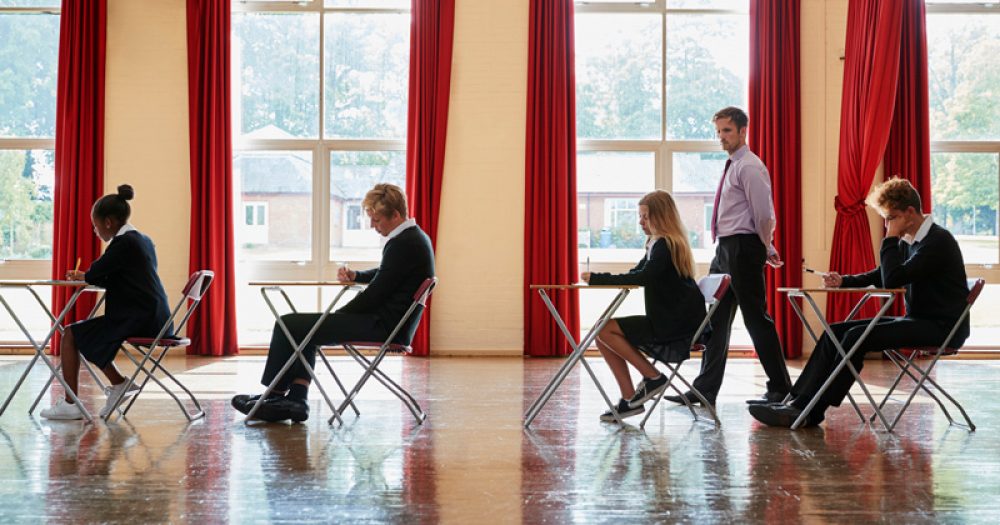Pupils who study international GCSEs are more likely to get top grades, but often underperform in their A-levels, a government study has found.
The Department for Education compared the performance at key stage 4 and 5 of pupils studying normal GCSEs and those studying iGCSEs.
It found pupils achieved “higher grades than expected” in English language and literature iGCSEs designed by both Cambridge Assessment International Education and Pearson, relative to corresponding GCSEs.
Pearson iGCSE students also did better than anticipated in maths, German and Spanish.
In some subjects, the gap in attainment identified was huge.
For example, in Pearson’s iGCSE in English language, the proportion of pupils achieving a grade 7 or A was a massive 25 percentage points higher than expected, while achievement in English literature, mathematics, Spanish and German was between eight and 13 percentage points higher.
In 14 out of 15 subjects with more than 100 entries analysed by the DfE, pupils achieved a higher average point score in Pearson iGCSEs than the equivalent GCSE. For the Cambridge qualification, achievement was higher in 13 of 21 subjects.
Nick Gibb, the schools minister, said today that although there was “no evidence of systematic differences” in standard between Cambridge’s iGCSEs and GCSEs, there was “some evidence” that Pearson’s iGCSEs were graded “slightly more generously on average than GCSEs” in 2018.
Most iGCSEs are now sat by pupils in private schools, following a decision by the government to remove the qualifications from school league tables in 2017.
Previous studies have also suggested the qualifications are easier than GCSEs, leading to the Labour party calling for an inquiry into the subjects amid claims private school pupils have an upper hand.
But data on the progression of pupils who took iGCSEs in the government’s new research actually found some went on to underperform at A-level.
For example, pupils taking Cambridge iGCSEs achieved lower A-level grades than expected relative to GCSE pupils, by around a sixth of a grade on average, while Pearson iGCSE pupils achieved around a quarter of a grade less.
A-level performance among Cambridge iGCSE pupils was “statistically significantly lower” in English literature, English language, history, geography, French and biology.
Conversely, they performed significantly better than their GCSE-studying peers in maths and physics, but entries in these subjects were small.
Pupils who took Pearson’s iGCSEs went on to achieve lower grades in A-level maths, sciences, English language, English literature, German, history and geography.
In fact, pupils who took the Pearson qualifications did not, on average, go on to outperform their peers in any A-level subject.
Christine Özden, chief executive of Cambridge International, said the report showed her organisation’s iGCSE “is aligned closely with the GCSE”.
“We are completely committed to maintaining comparability with GCSE,” she said.
“Cambridge iGCSE is an international qualification, and is used by nearly 5,000 schools in 150 countries. The content and structure of Cambridge iGCSE was a model for the new GCSE in England, so we take some pride as the new GCSE becomes more established.”
A spokesperson for Pearson said its iGCSEs “are developed, designed and benchmarked to be of equivalent standard to our GCSE 9-1 qualification regulated by Ofqual”, and that qualifications are regularly reviewed and adjusted “to ensure comparability”.
“The findings from DfE’s data analysis of 2018 results reflects this, with relatively small differences of around two or three marks for a subject,” the spokesperson said.
“At subject level, the data shows very small changes of less than 2 per cent at 4/C and slightly larger differences at 7/A. As part of our continuous review and improvement work these will be incorporated into our awarding in 2020 to ensure ongoing alignment.
“We recognise there are some valid comparability points raised in our English language coursework international GCSE qualification. We have started work already to act on this – our processes ensured that in 2019 we had taken action by adjusting the coursework boundaries and we will continue these adjustments in 2020.”
Pearson will also complete further specific research into maths outcomes during 2020, the spokesperson said, because the DfE’s findings differed from their own.
In a letter to the parliamentary education committee, Nick Gibb, the schools minister, said it was “important to note” the analysis is based on one year’s data, and that changes made by exam boards “may give a different picture in 2019”.
“It should also be noted that small variations in standards between different qualifications and between years are normal.”








The IGCSE’s global reach means that comparing performance at IGCSE and A-level needs far more nuanced understanding of the context of those students, many of whom are working in their second or third language and for whom the literacy demands of A-level study (especially in those subjects mentioned) are particularly exacting.
Hi,
I read with interest this article and I am disturbed by these findings in as much that it is only the Private schools that are offering these exams and that throughout the course the only form of assesment is Tutor Marked exams.
In my mind these are completely different types of course and should not be compared, except for the top grades – much like the O and CSE exams of the distant past.